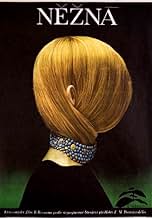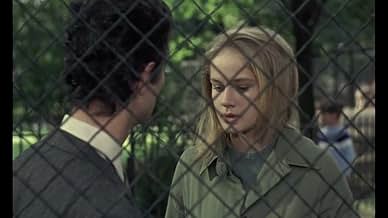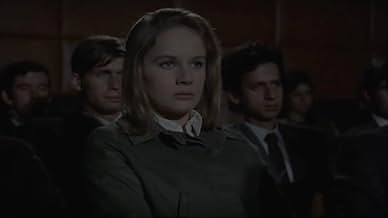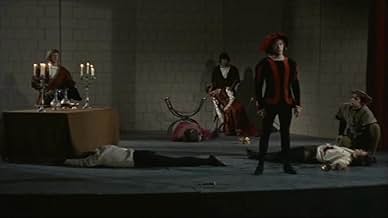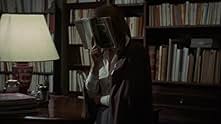Une femme douce
- 1969
- Tous publics
- 1h 28min
Ajouter une intrigue dans votre langueA young woman kills herself, leaving no explanation to her grief-stricken pawnbroker husband. We learn in flashback about how they met, married, and how she failed to adapt her lifestyle to ... Tout lireA young woman kills herself, leaving no explanation to her grief-stricken pawnbroker husband. We learn in flashback about how they met, married, and how she failed to adapt her lifestyle to his. Disgusted with his attempts to dominate her, she considered murdering him, but found ... Tout lireA young woman kills herself, leaving no explanation to her grief-stricken pawnbroker husband. We learn in flashback about how they met, married, and how she failed to adapt her lifestyle to his. Disgusted with his attempts to dominate her, she considered murdering him, but found herself unable to do it.
- Réalisation
- Scénario
- Casting principal
- Récompenses
- 1 victoire au total
Avis à la une
Une femme douce is enigmatic, subtle, full of ellipses and misunderstandings. It is a moving analysis of the loneliness of a marriage and the unsatisfactory human condition: on the one hand there is blindness to reality, and on the other the intuition of a need and an impossibility to transcend that artificial reality that we construct for ourselves.
The characters are locked in a life of sufficient economic relief, in a complacent conformity that suffocates the young woman. The film narrates this chronic dissatisfaction with a life that is reduced to systematically improving material conditions.
Without stridency, without effects, with profound humility, Bresson's style was never more suitable, never more static and transcendent than in this film of two solitary beings: a man locked in his own prison and a woman caged in the golden cage of economic security.
The first scene shows us the girl's suicide in a static and unforgettable shot: the table that seems to collapse eternally on the balcony indicates that the girl has just jumped into the void and at the same time gives the sensation of an unfinished action, which It seems to stop in time.
Next the husband remembers before the corpse how he met her, fell in love with her, and saved/bought her.
The girl has had a past of economic hardship, of squalor; the boy has had a setback that has taught him how fragile prosperity is.
There is something of a hunted and trapped beast in Sanda's gaze. From there everything is mystery and conjecture in the marriage relationship.
Une femme douce is the great leap in Bresson's style towards his final maturity, that of works in color. Afterwards there will be no substantial purges.
I only have one scene left over: that awful representation of Hamlet, with its subsequent commentary, seems like a declaration of principles, an aesthetic creed enunciated without any elegance. An incomprehensible beginner's mistake in an author in full maturity.
Although the film is Bresson's first in color and perhaps more accessible than many of his films, it is also full of his typically enigmatic details and coincidences that may be clues to the fate of the characters. Like most of his films, the actors are non-professionals with the exception of Ms. Sanda and the performances are emotionally detached yet rich in nuance and body language and the overall experience is powerful and haunting. In flashback, we discover that her husband Luc is a pawnbroker and the two meet when she comes to his store to sell a crucifix. The distinction between her spiritual nature and his obsession with material things is apparent when he strips off the plastic statue of Jesus, keeping only the gold cross that he deems to be of some value.
Moved by her poverty and enamored with her striking features, he pays more than the cross is worth, but she returns it to him saying that she cannot be bought. Though he pursues her with determination, Elle at first resists. "You don't want love", she tells him. "You want me to agree to marry you." Luc insists that he can take her away from her sordid surroundings and provide her with a home, saying, "Say yes and you can leave here forever." And she at last agrees but it is clear from the beginning that the marriage is a mismatch and throughout the film, Bresson conveys a growing mood of claustrophobia and growing oppressiveness. Luc appeals to her spiritual nature by taking her to museums, operas, and plays and buying her phonograph records but there is something missing.
On the surface he loves her, but he is cold, humorless, and unable to understand or meet her deepest needs. On the other hand, Elle is withdrawn, given to long periods of silence, and makes little attempt to communicate her feelings. Indeed, she may be clinically depressed, but Bresson deals with people's problems in existential rather than psychological terms. "For myself", he has said, "there is something which makes suicide possible, almost inevitable the feeling of void which is impossible to bear." Perhaps Bresson views suicide, at least on one level, as an act of spiritual redemption and A Gentle Woman may have that implication, though the film is very much open to interpretation.
One day Elle picks up a gun and points it at Luc but cannot pull the trigger. Inevitably they fight over money and his jealousy surfaces when he discovers her sitting with a young man in a parked car, even though he hears her reject the man's advances. When she becomes ill, he is generous in providing treatment and the relationship seems to be moving in the right direction until, both fearful of intimacy and afraid of being alone, something within her snaps. Mentally confused or perhaps clear for the first time, she steps out onto the balcony and finds her way home.
Une Femme Douce is a story of a love that fails, and feels very realistic. The success is down to the Bressonian style, which I usually find antithetical. Normal people as opposed to professional actors, are not very facially demonstrative; so when I saw the couple in this movie I really felt like I was watching a real couple. The lack of demonstration leads to a sense of ambiguity at key moments. There's a kind of Renoir-ian multifacetedness which tends to see a person as a congregation of souls pulling in different directions, jostling for the rudder, rather than as a coherent identity. But there's also ambiguity in the sense that the couple plain just can't read each other at points. There are several examples of uncorrected miscommunication in the film which again feels very authentic in terms of relationships.
Some people have great difficulty finding someone to love and share their lives with, may only get one attempt at something that could work, and often fail. That's a great, very human tragedy, that you don't get to see very often at the cinema. This story of a young couple, the man a pawnbroker, Luc, the woman simply known as "elle", is a story of two people who don't fit in modern life. She is fey, inquisitive, at home with the natural, distrustful of people, and entirely at odds with the systems of living that define human "progress". Luc is the opposite, a creature of the system, he makes money from debt, has fixed expectations about relationships, and lacks spontaneity. She suffers from weltschmerz, a pain of the sensitive that arises from an understanding or feeling of how life could or should be in comparison to the dismal and feeble structures that we have. They try to inhabit the centre ground together, but the compromise doesn't hold.
I like that the film acknowledges that even the most significant moments in a person's life can be fairly banal, a fleeting disengaged conversation on a bench at the zoo in this film.
Although I chose to see the film as a rather blameless story, you could view "elle" as the victim of Luc, who compares himself to Mephistopheles at one point. The film is feminist under that sense, although I think in a very patronising way. For example, at various points in the movie, the TV in their apartment shows spectacles which are very male-oriented, such as motor car racing. There's a sense that culture is about the male, that authentic female culture is something rare and unpreserved. I don't think that "elle"'s condition is unique to women, it actually reminds me RD Laing on schizophrenia: "The experience and behaviour that gets labelled schizophrenic is a special strategy that a person invents in order to live in an unlivable situation."
It's worth pointing out that the film is substantially aided by the talents of Ghislain Cloquet, one of the great cinematographers, who certainly was shooting only top drawer material in this film.
It is a matter of irony to me that although Bresson chose non-professionals, as usual, for this film, Dominique Sanda ("elle") later went on to win Best Actress at the Cannes Film Festival seven years later. The role demanded someone beautiful, so Bresson picked her up from her job as a model for Vogue. Guy Frangin (Luc) on the other hand has this film as his only credited role.
Le saviez-vous
- AnecdotesRobert Bresson chose Dominique Sanda just as a result of her first voice call.
- Gaffes(at about 18 minutes) Guy and Dominique swap places in their cinema seats before they are actually seen to do so in the final shot of that scene.
- ConnexionsFeatures Benjamin ou Les mémoires d'un puceau (1968)
Meilleurs choix
- How long is A Gentle Woman?Alimenté par Alexa
Détails
Box-office
- Montant brut mondial
- 2 356 $US
- Durée1 heure 28 minutes
- Mixage
- Rapport de forme
- 1.66 : 1
Contribuer à cette page


